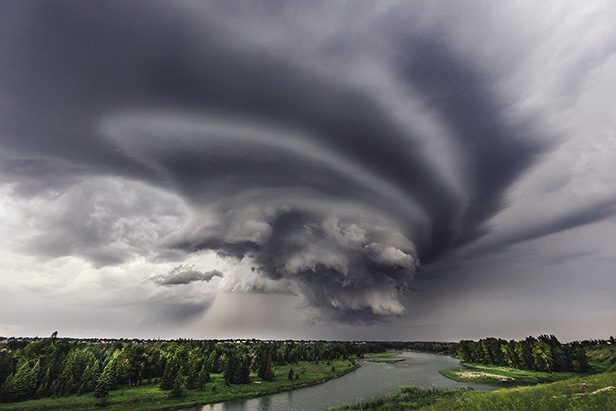
Severe weather across Canada continues to highlight the financial costs of climate change to insurers and taxpayers. In 2019, floods, rain, snow and windstorms damaged homes, vehicles and commercial properties. Insured damage for these severe weather events reached $1.3 billion last year, according to Catastrophe Indices and Quantification Inc.
Notably, 2019 ranked the seventh highest in insured losses on record. Like 2018, no single event in 2019 caused the high amount paid out for losses. Instead, Canadians and their insurers experienced significant losses from a host of smaller severe weather events from coast to coast.
Top Insured Damage Severe Weather Events in 2019
| Date | Event | Loss ($ million) | Location |
|---|---|---|---|
| January 24 to 25 | Winter storm | 40 | Eastern Canada |
| February 3 to 4 | Winter storm | 70 | Ontario |
| February 24 to 25 | Winter storm | 48 | Southern Ontario |
| Mid-March | Two winter storms | 114 | Greater Toronto Area and Eastern Canada |
| April to May | Floods | 208 | Quebec and New Brunswick |
| July and August | Hailstorms | 181 | Western Canada |
| September | Hurricane Dorian | 105 | Eastern Canada |
| October | Storm | 250 | Eastern Canada |
Top-10 Highest Loss Years on Record
| Rank | Year | Total loss ($ billion) | Notable severe weather event |
|---|---|---|---|
| 1 | 2016 | 5.261 | Fort McMurray, Alberta, fire |
| 2 | 2013 | 3.418 | Alberta and Greater Toronto Area floods |
| 3 | 1998 | 2.494 | Quebec ice storm |
| 4 | 2018 | 2.113 | Multiple events including Ontario and Quebec rainstorms and windstorms |
| 5 | 2011 | 1.740 | Slave Lake, Alberta, fire and windstorm |
| 6 | 2012 | 1.456 | Calgary rainstorm |
| 7 | 2019 | 1.334 | Multiple events |
| 8 | 2005 | 1.299 | Ontario rainstorm |
| 9 | 2017 | 1.255 | Multiple events |
| 10 | 2010 | 1.226 | Calgary rainstorm |
As the financial cost of severe weather rises, Insurance Bureau of Canada (IBC) is advocating for all orders of government to increase their investments in mitigating the impact of extreme weather and in building resilience against the damaging effects of extreme weather events. IBC promotes investing in upgraded infrastructure to protect communities from floods and fires, improving building codes and land-use planning, and offering incentives to shift the development of homes and businesses away from areas at highest risk of flooding.
It is not only insurers who foot the bill for severe weather damage, it's also taxpayers. Consequently, IBC is advocating for all stakeholders to work together to reduce the financial strain that flood events cause. For every dollar paid out in insurance claims for damaged homes and businesses, Canadian governments and taxpayers pay out much more to repair public infrastructure that the severe weather has damaged.
Visit IBC's website for information on how to prepare for a disaster and home flooding mitigation techniques.
Quote
"The cost of climate change to Canadians, their businesses and governments continues to rise said Craig Stewart. IBC encourages all orders of government to work together to reduce our collective climate risk, beginning with a national action plan to address flooding," said Craig Stewart, Vice-President, Federal Affairs, IBC.

